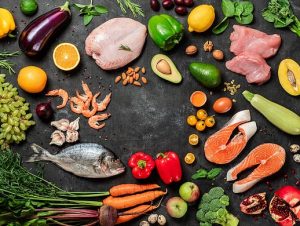
Quantitative rankings of multiple dietary patterns for their effects on non-communicable disease (NCD) biomarkers is lacking and would inform primary prevention strategies.
Accordingly, a network meta-analysis (NMA) was conducted to compare and rank the effects of different dietary patterns on NCD biomarkers, and associations of dietary patterns’ underlying macronutrient composition with NCD biomarkers were determined by a nutritional geometry approach…
No dietary pattern ranked consistently highest. The Paleo diet received the highest all-outcomes-combined average Surface Under the Cumulative Ranking Curve value (67%), followed by DASH (62%) and Mediterranean diets (57%), whereas western habitual diet was lowest (36%). Our findings were independent of macronutrient composition, highlighting the significance of dietary pattern-level analysis.
A primer: What is the paleo diet?
The paleo diet attempts to mimic the diet that a caveman or hunter-gatherer societies might eat.
The paleo diet consists of: Fruits, Vegetables, Lean meat like grass-fed beef and game meats, Fish, including those high in omega-3 fatty acids like salmon and tuna, Nuts, Eggs, Seeds
These are the foods that are eliminated when on the paleo diet: Grains, Legumes, Dairy, Refined or added sugar, Added salt, Highly processed foods, Certain vegetables that are high in starch like corn, peas and potatoes.
Conclusions
Our NMA showed that the Mediterranean diet was likely the most effective dietary pattern in lipid profile improvement, a low carbohydrate high-fat diet may be beneficial for glycemic control, and the Paleo diet appeared best for reducing inflammation.
No dietary pattern performed consistently best across all major NCD biomarkers or categories, although overall the Paleo diet, DASH diet, and Mediterranean diet had the highest ratings.
The majority of the confidence of evidence ratings were low, indicating more research is needed including high-quality randomised trials with clinical outcomes to determine whether the Paleo diet indeed has a role in NCD prevention. Furthermore, our findings were predominantly independent of macronutrient composition, highlighting the potential importance and significance of evidence and advice at the dietary pattern-level.
That was a lot to get through.
What this study really highlights is that all of the diets listed require that sugar and ultra processed foods be avoided. That grains are either eliminated or severely curtailed. Which means that the “western habitual diet” was least beneficial at improving a lipids profile, insulin resistance and inflammatory markers.
Want to get healthy? Stop eating ultra processed foods, sugar and excess grains.
